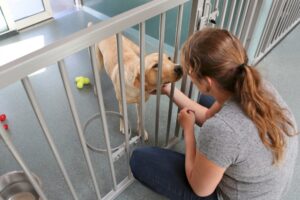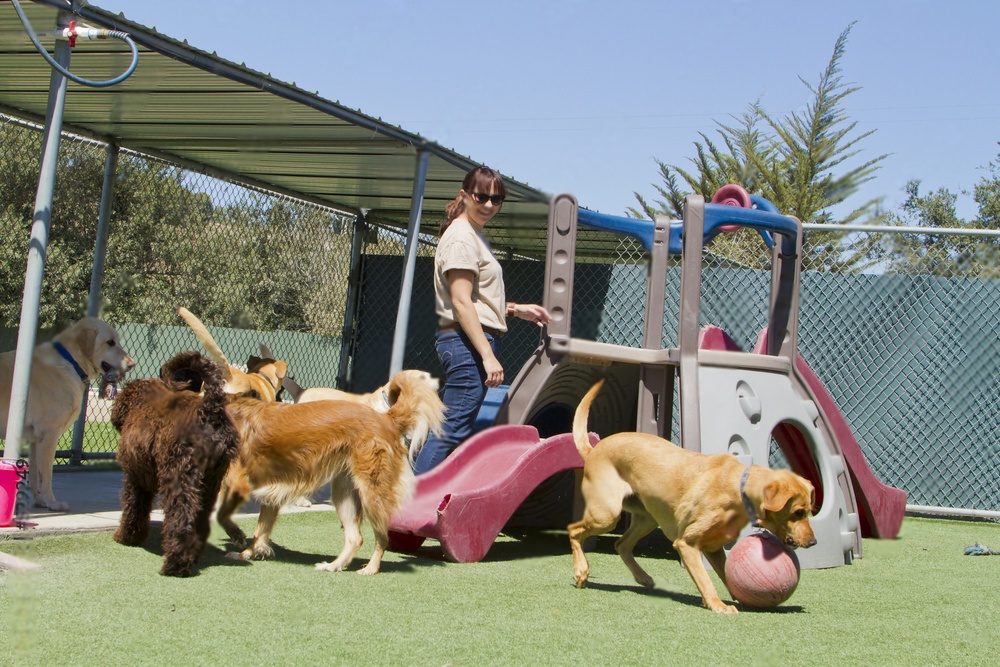Dogs are not just pets; they’re part of the family, offering endless affection, unwavering loyalty, and boundless joy to their owners. Their presence fills our lives with warmth, making the thought of leaving them behind, even for a short while, a tough decision.
Yet, life sometimes demands it, some circumstances will require us to be away from our dogs for some time. It could be for a business meeting, a much-needed vacation, or other unavoidable circumstances. During these times, ensuring our furry friends are safe and well-cared for becomes our top priority, and this is where boarding facilities come into play.
Boarding offers a secure environment where our dogs can stay, play, and receive the care they need in our absence. However, at what age can a puppy be boarded?” This is a very common question among dog owners and in this blog post, a vet-approved answer has been revealed.
The ideal minimum age for boarding a dog is around 4 months. By this age, puppies are generally less vulnerable, having received their complete set of puppy shots, which is crucial for their health and well-being in a new environment.
Aside from age, there are even other factors to be considered before proceeding to board your dog. In this blog post, everything you need to know about boarding your dog has been revealed. You will also get to know the things to look out for in a boarding facility before proceeding to register your puppy with them.
Without further ado, let’s proceed!
Factors to be Considered before Boarding your Puppy.
While age is a crucial factor that determines if your dog should be boarded or not, there are other factors you should keep in mind.
When considering if your dog is ready to be boarded, here is a list of items to keep in mind:
1. Vaccination

Before boarding your dog, ensure your dog has received a complete shot of vaccination, including rabies and canine parvovirus. By doing this, there will be a low risk of disease spread among the dogs in the boarding facility.
A responsible boarding facility always requests proof that your dog has received if not complete, at least the first round of vaccination. This is to ensure that all the pets in the facility are safe and free from contracting illness during their stay.
If a boarding facility doesn’t ask you to provide proof of your dog’s vaccination track record, proceed to another boarding facility.
2. Treat Fleas and Ticks and Deworm your Dogs.
This is another factor to consider before boarding your dog. Ensure your dog is free from fleas.
ticks and internal parasites like tapeworms, hookworms, and roundworms. These can be achieved by using flea repellent products and by deworming your dog respectively.
Deworming dogs before boarding helps protect them and other pets from parasites, and most facilities require proof of recent preventative treatments.
3. Socialization
Boarding facilities are usually crowded, and puppies not used to socializing might struggle to adapt. This is why it’s crucial to always start socializing dogs from puppyhood.
While few boarding facilities might have separate spaces for less sociable dogs, many don’t have this option. But the good news is, that most of these pet facilities are equipped with experienced staff skilled at helping your puppy adjust and feel comfortable in no time.
4. Exercise
Another factor to consider is your dog’s exercise level. If your dog likes exercise, choose a kennel that encourages exercise. Make sure to suggest a few exercises to the experts handling your dog.
Age Group to Consider When Boarding a Puppy

Now that we’ve known the factors to be considered before boarding your puppy. Let’s discuss age requirements.
0-3 months
Puppies within the age of 0 – 3 months shouldn’t be boarded because at this young age, these puppies have not received their complete vaccination and they are very vulnerable to diseases like parvovirus, rabies, distemper, etc.
Aside from the vulnerability, puppies under 3 months old will require more care and frequent daily feedings due to their small-sized stomach.
4-6 months
Puppies between 4 to 6 months are ideal candidates for boarding as they’ve likely received their complete vaccinations, making them less vulnerable to diseases.
Besides having their health defense up, these young pups, while still needing constant supervision, are at a stage where they can start to handle short periods away from their owners.
7+ Months
For puppies above 7 months, boarding becomes an even more viable option. By this age, they have not only completed their vaccination schedules but have also started to mature mentally and emotionally.
This maturity means they can better cope with the separation from their owners and adapt more easily to the boarding environment.
These older dogs can also benefit greatly from the socialization opportunities boarding facilities offer, allowing them to interact with other dogs in a controlled and safe setting.
Questions Every Dog Owner Should Ask a Boarding Facility

Before deciding to board your puppy with a facility, there are some common questions the pet parents should ask the facility personnel. These questions are aimed to ensure your pup’s well-being and safety during his stay in the facility.
Below are some of the questions:
- If your dog eats special food or vaccination, will they be able to accommodate your dog’s needs?
- Do they have a separate room for dogs in heat?
- Will they recognize if your puppy needs medical services?
- Do they have a room for performing exercises like running and walking?
- Are they capable of handling an aggressive or gentle dog?
- Are the facilities trainers and personnel certified?
- Do they have webcams that can help you stay in touch with your dog even while you are away?
- Do they separate dogs according to age, size, breed, or temperament, or all dogs are kept in the same space regardless of age, size, and temperament?
- Do they have vets that can easily come to dogs’ aid in the case of an emergency?
These questions above are crucial for the safety of your dog, and positive answers to them will keep you rest assured that your puppy will be fine even while you are away.
What Are the Side Effects of a Boarding Facility
Dogs rarely develop trauma as a result of boarding. If the proper preparations and investigation are taken before picking a boarding facility, your dog should have no negative consequences while there.
When your dog first returns home from a care facility, they may feel puzzled by their routine. They may consume somewhat more food, beverages, or sleep than usual, or they may desire your company more frequently. Give them a few days to re-establish their routines, and they will certainly return to normal. Don’t be too concerned.
Frequently Asked Questions
What is the youngest age you can board your dog?
The ideal minimum age before considering boarding your dog is 4 months. At this age, your puppy would have received a full regimen of puppy shots, and they are less vulnerable to diseases.
Do dogs do well in boarding?
While others do well in boarding, some struggle. There are procedures you can take to ensure your dog does not struggle in a boarding facility. Some of these procedures include choosing a good facility that offers plenty of human interaction and appropriate playtime with other dogs.
You may also provide your puppy with some familiar items like their bed, toys, or a piece of clothing with your scent or perfume. Doing this can comfort them and also make them feel at home.
Conclusion
At what age can a puppy be boarded? the ideal age falls around 4 months. By this time, puppies have received crucial vaccinations and are less vulnerable to diseases.
However, not only dog’s age decides when a puppy can be boarded, other factors like the ability to socialize, the dog’s vaccination status, and facility considerations also play pivotal roles.
Ensuring your furry friend’s safety and comfort involves careful vetting of boarding facilities and addressing any concerns beforehand. Ultimately, with proper preparation and consideration, boarding can be a positive experience for both pet and owner alike.
Before you go, you can also read: What vaccines do dogs need for Boarding?







Leave a comment